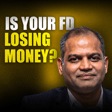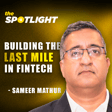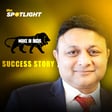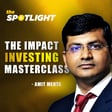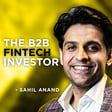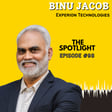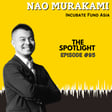Become a Creator today!Start creating today - Share your story with the world!
Start for free
00:00:00
00:00:01

Building the tech stack for insurance | Arun Balakrishnan @ Xceedance
Xceedance is building a unified suite of services and products for insurance companies, helping them in their digital transformation journey and creating cutting-edge products for the next-gen customer. Arun was recruited as a very young India CEO for Berkshire Hathaway Insurance, which paved the way for him to eventually start Xceedance.
What you must not miss:-
- Building a 100 million dollar business without funding
- The Backend technology powering insurance businesses
- How tech will impact insurance
Transcript
Introduction and Background
00:00:00
Speaker
Hello, everyone. My name is Arun Balakrishna. I'm the founder and CEO of Percedence, a global insurance service as well.
00:00:20
Speaker
If you want to learn about opportunities in the insurance space, then you will love this episode. It is a masterclass on all things insurance. Arun Balakrishnan, the co-founder and CEO of Exceedence, talks to Akshay Tath about the entire insurance value chain and the major stakeholders in insurance space in this episode.
00:00:38
Speaker
Excedence is building a unified suite of services and products for insurance companies, helping them in their digital transformation journey and creating cutting-edge products for the next-gen customer. Aurun founded his startup straight after graduating from IMM, which eventually did not scale. He was then recruited as a very young India CEO for Berkshire Hathway Insurance, which paved the way for him to eventually start up Excedence, which has been bootstrapped and profitable right from the start.
Challenges and Learning Experiences
00:01:05
Speaker
Stay tuned and subscribe to the Founder Thesis Podcast on any audio streaming platform to learn how to build bootstrapped and profitable global businesses.
00:01:29
Speaker
We bought our batch mates. We decided, nightly at that time, let's start a business straight out of campus. So we turned down our jobs and everything. In hindsight, it's not like we might have had a job, but when we graduate, but yeah, we decided to start a business straight out of campus. And when we graduated,
00:01:49
Speaker
We set up this e-commerce portal called lootstreet.com. We wanted to be like eBay had introduced auctions. We tried out the haggling business model, thinking that's what would work in India. They didn't go anywhere and nobody was really.
00:02:06
Speaker
I know VCs and all much had money at that point of time and everything. I mean, we did that for some time, but eventually ended up pivoting to a different business more around insurance. I mean, it was online insurance products because the only companies who were willing to pay for leads and advertising online those days was the financial products companies or back insurance companies.
00:02:29
Speaker
We got into the space of aggregating insurance products and other financial products and selling those leads to insurance companies, others.
00:02:39
Speaker
Yes. So policy reserve started in 2007. It also started just about the same time for what she has done. He probably didn't execute as well as he did. But Evan, you could not catch up with them in terms of fundraise. I think it's the biggest advantage at that point of time. I think it's quite a very smartly was when they started the business, they had about $5 million from Nokvi to start in the Senate.
00:03:06
Speaker
we didn't have much money and we managed to raise some angel rounds from readup.com and everything. But then we had a few things not going in our favor, not only the lack of capital and everything, but reflect back on those days. I don't think myself or even Kaushik had that kind of experience and all to drive what this business needed as well. And the market in India at that time was a bit early for it, right? For those reasons, and eventually we had to take up jobs and broke
00:03:36
Speaker
Nobody was really putting much money those days. So then quickly through one of the VCs I knew, they connect me to a portfolio companies of theirs called Netambit.
Career Breakthrough at Berkshire Hathaway
00:03:50
Speaker
I joined there in 2010 to start their e-commerce portal for insurance. We have called from
00:04:00
Speaker
the HR-headed Pajaj Alians, that Alians is doing a joint venture with the Bakhshat, with the Sartan and Sartan set up in India, and they're looking for CEO and we all talked to you. So my first thought was this clearly a mistake. They don't know how much experience I have or anything like that, but it was a chance to get interviewed by Mr. Ajithya while like, you know what?
00:04:25
Speaker
I'll take a chance with this one. Is Ajit Jain a big deal? Just help me understand. I'm not familiar. Ajit Jain is the Vice Chairman of Berkshire Hathweg Group.
00:04:36
Speaker
Okay. Warren Buffet is right hand man. He manages the entire insurance business. It's probably one of the most well-known executives in the insurance business and to the chance that time and showed up for the meeting and everything in Trident and Gurgaon.
00:04:57
Speaker
they were serious about it. And so one of the best insurance companies in the Berkshire Hathaway Group is a company called GEICO. And they have a direct-to-consumer business model for selling insurance from the US. And if a Berkshire Hathaway was to set up a company of entity in India, which could replicate the direct-to-consumer business model, and the challenges, of course, were there foreign investment laws.
Strategies and Market Entry in India
00:05:21
Speaker
Right, FDI that time was only 26%. So, part possible for Berkshire Hathaway was to set up as an agency working with the Bajaj Arlenz group. So it was 20% where 80% was Berkshire Hathaway, 20% was Arlenz.
00:05:38
Speaker
And that's how that thing was being said. Right now, when I had interaction, I still remember that very well. One of the things I was most impressed with was the value system of Berkshire Harkley Group and how would you thought about the business and everything. And it was a no-brainer. So I fortunately fell into a very small group of people in India at that point of time.
00:06:01
Speaker
who could claim to have experience in insurance, internet, and had some good academic background, so on and so forth. I was probably younger than what they were looking for, but my entrepreneurial experience made up for that. I was thinking about when you say this journey about acceptance, I think.
00:06:19
Speaker
It was at least good five years before that would lead up to it as well. I want to understand this arrangement between Berkshire Hathaway and Bajaj Allianz better. Berkshire Hathaway would run Bajaj Allianz.com or Berkshire Hathaway would run an independent cycle of policy. They would set up an insurance-broking business in India and sell primarily Allianz. At that point of time, even broking was under FDI.
00:06:45
Speaker
that you could only be as a direct colleague. We had a separate brand called BerkshireInsurance.com. So the brand was Berkshire Hathways policy, but the actual underlying policy was of Bajaj Agar. But the brand, the platform was ours. And the goal of that platform was, let's build the Berkshire Hathways brand, explore the business model, see how it goes. And eventually, when the FBI laws changed, then we can become a carrier. And that was the path we set ourselves on.
00:07:16
Speaker
So the corporate agency mechanism was only one which the regulator permitted for 100% foreign ownership at that point of time and that's the path we took.
Insurance Ecosystem and Operations
00:07:27
Speaker
Can you break down the ecosystem? Corporate agency, broker, carrier, who are the stakeholders here and what is the difference between each of them?
00:07:36
Speaker
Absolutely. So I think, so then I'll walk you through it in the Indian context and globally. And there is, firstly, there is that capital side. So there's insurance companies, then insurance companies buy insurance for themselves. That's called green insurance companies.
00:07:56
Speaker
So that's the capital part. And then there are some more structures around insurances, security, Skype points, but they became very mixed. But the principle that insurances are reached.
00:08:09
Speaker
Then comes the distribution side of it. So how the products get to customers. So there either you can go directly to your consumers or you work with brokers. Now the brokers are representative of the clients. They are not representative of the insurance company. So what broker will do is you want to buy insurance, they will represent you and get
00:08:34
Speaker
quotes from respective insurance companies. And you get paid by the insurance company, not from the client. A corporate agent or an agent should be a dedicated employee of the company. And if it's a corporate agency, it works specifically. That time when we were doing it, it was only one insurance company. So an agent represents only one insurance company, which I think it expanded to three now.
00:09:02
Speaker
And I will know the exact one in India at the moment, but it exists. Operate agent represents the insurance. And if you're taking the global context, there is the brokers further get broken down into wholesale brokers, retail brokers. And there's an ecosystem called managing general agents, who basically act entirely like an insurance company, except taking the balance sheet. So as with many things in insurance, and you'll see along the discussion, we tend to complicate many things.
00:09:32
Speaker
This difference between a corporate agent versus a broker seems like semantics, right? In both cases, they earn from the seller of the policy only. Yes, but a corporate agent does not have the ability to offer the product of a company, which a broker who buys a regulation can go to any insurance and get that for you. So that's how it's defined in the laws. Okay. Got it. Okay. Okay.
00:09:59
Speaker
So Berkshire became a corporate agent for Bajaj Aliens. Okay. Yeah. So we provide a team is when we ran the per plan in the Berkshireinsurance.com. We got to a good policy on the base. Principal products we were selling were auto travel and we just started health, but mostly direct lines, working with the customers directly, selling directly using our contact center team and our online platform. That's what we did.
00:10:28
Speaker
More than anything, the thing which I really did in the world this time was I had a chance to become an entrepreneur again in some sense, because I'm sure there's a phenomenal culture around that about the controllers of the manager who went to decide and think in a very long way. I don't joke about it when I talk to people and describe it,
00:10:49
Speaker
I feel the stint for me as the Berkshire CEO was probably more entrepreneurial than my own venture fund. I've been to investors and this versus the culture was so different, right?
00:11:03
Speaker
In 2013 is when the laws around FDIs were not really changing, and it was a loss-making entity. The business model is such that it requires a lot of scale and effort to get to it. So the choices before Bhattacharya was really to keep losing money, and whenever the laws change, we get in, or we just get in when the laws change. So that was the second part was what Bhattacharya decided to take.
00:11:30
Speaker
And in 2013, we decided to close down the direct setup in India. Bakhshatra still does a lot of reinsurance. That time, I was also helping in some areas. That continued with the direct side of the business. We decided to close down the team and everything in 2013. There is no MDI requirement for reinsurers. Reinsurers can be global companies.
00:11:54
Speaker
So there is a requirement if you want to keep the capital in India and things have changed a lot in the last 10 years. Back then you could have a branch in there and it's not possible to find all the capacity which insurance companies needed in India anyways.
00:12:12
Speaker
So they were allowed to go outside and everything, so that did exist. Over now, it's changed. Now they're allowed to have one branch. I think Lloyd's is there. I won't be as well versed with it today, but it's a lot more flexible than what it was. And reinsurance would take a portfolio, say, 1 lakh current insurance policies and reinsurance. What would be the terms of this? I'm just trying to understand the sector. Absolutely. So think about it like this.
00:12:41
Speaker
And insurance company's biggest risk is concentration. So one big hurricane happens or one big cyclone happens but Mumbai's lads happen and a big amount of risk comes. It can be a capital risk. So they buy reinsurance for extreme situations like this.
00:12:57
Speaker
So you unfortunately don't get to pick and choose because it's a selection there. And insurance company would go to a reinsurance company and say, hey, you know what? Here is 30% of my portfolio. All 30% of premium is for you. All the losses from this 30% of that you pay us. And by the way, I helped you sort some business.
00:13:19
Speaker
So you give me some permission. So the insurance company gets a commission from the insurance company. In the same proportion, the losses and premium are divided. There are ways to buy the insurance. You say that up to 100% of losses, I will pay, but beyond that, the reinsurance will pay. So for that reinsurance, charge a premium to the insurance company.
00:13:41
Speaker
So models work like that, but that's a capital heavy business and this is more operational and ready distributions. Okay. Okay. Got it. So then like once Berkshire decided to take a break from India.
Founding and Growth of Exceedence
00:13:56
Speaker
Yeah.
00:13:56
Speaker
At that point, I was fortunate to be presented a very interesting opportunity by the Berkshire team. They didn't want to have any legal entity in India and lend that way. They said, we like the team. If you set up a company which could provide some underwriting services, actuaries, some back office, we would be keen to work with you. Here, when I gave it some thought with my wife, it was a chance to become an entrepreneur working with a company I loved working with.
00:14:24
Speaker
I had a business model which doesn't require me to raise any money and everything like that. It has good unit economics and it'll start slow, could grow, but it seemed like an opportunity which was definitely worth trying and very interesting. I told yesterday, spoke to the senior management team of Berkshire India, two people, Manish and Amit, joined me as co-founders in Excedence. And how did you know Manish and Amit?
00:14:51
Speaker
Were they working with you and also Akshay? Work show India. Yeah. So Amit was running the IT side. He was the CIO. Manish was CEO. So they came along with these roles. And about 10 analysts and associates also joined us in this business.
00:15:07
Speaker
With a team of about 13 people and two Berkshire Hathaway Group companies as our anchor clients, we started the business. This was June of 2013. Berkshire didn't do any equity investment, but they gave us a good two-year contract for a small portion of people and everything.
00:15:28
Speaker
And that's the origin story of a cheetah. So when we started the business and the first obvious question was, are we too late to this whole outsourced authority? It was 20 years old by then. The second thing I realized and maybe a bit too late is that the grand total experience I had in services was zero. If I added the experience of Manish and Amit, it was still zero.
00:15:54
Speaker
You think we knew it was insurance and the thing that we felt when it's exploded this whole thing of you teach us your job and we do it cheaper didn't have the best thing to it and we felt
00:16:08
Speaker
This will eventually erode. I think that you will have to demonstrate yourself as a partner and expertise would be expected. And India had the talent pool for it as well. We decided rather than becoming an IT company or a BPO company or analytics KPO, we'll do everything but only one industry. So how much it used to be? We think of us as an insurance company without capital, without distribution.
00:16:36
Speaker
Anything else which requires to run an insurance company, an MGA or reinsurer or anything, we actually run right-hand claims. We will build out the whole thing. Of course, on day one, we didn't have everything.
00:16:49
Speaker
yet to gradually build it out. But that's the vision with which we start. And our whole thing was we will put the industry expertise of the front and center. When you speak to us as partners, our IoT team would understand your business. Our back office team would understand your business. We'll come to you as how we think is the best. And the fact that it is cheaper is incidental to the process and not the value process.
00:17:15
Speaker
And the biggest credibility we had was one of the largest names in the insurance business was Aklai. Helped us open doors and gradually build out from there. So that was the vision we started first two years. So one quick question here before the first two years story. What are the things which an insurance company needs to do to run? What is actuarial? If you can just, for an outsider, if you can just describe how an insurance company runs, what are those pieces which you propose to offer?
00:17:46
Speaker
Yeah, let's think about it. Three phases, right? First is, you know, what to send, right? When it's the real product which needs to be designed, okay? Suppose you want to insure your home, so a home insurance is a product, auto insurance is a product, business insurance is a product. So designing that product has two phases to it. One is, what should be the terms and conditions of the funds? How should we select
00:18:14
Speaker
the particular risk to take for that and what should be the premium to be charged. Premium is a mathematical exercise, depends on a lot of variable. You take a big pool of people, you observe, coming up, all the actuaries and the work associated with creating a product goes in, right?
00:18:33
Speaker
Then the elements of the what are the terms condition that's really expertise driven from an insurer's side, lawyers get involved every part. And finally, okay, this is the product, but if somebody comes in with a very expensive cart, like a Ferrari, you don't want to underwrite that because of your product definition, that could be a bad test. So that risk selection, how it happens is called underwrite.
00:19:01
Speaker
So once it's designed, evaluating risks to see whether they fit your criteria or not is under it. Once that happens, then the basics of the work start about actually issuing a policy, collecting the money, doing finance and accounting around with it, bookkeeping associated. That's all back office to middle office kind of things.
00:19:25
Speaker
Eventually, the main thing insures families in the business board is paying claims. So if you come back with a loss, seeing whether the new, the loss is worth paying, is it covered, not covered, educating it, paying it, all that is a function of the claims and gestures in it. What do you mean by educating it? Like educating the loss? What is? And adjudicate. Oh, and adjudicate. Okay. Yes.
00:19:51
Speaker
You come in, what is the exact loss amount to be paid to you? Frankly, there's a case of mass fraud, like you're going down your warehouse and you're claiming that there's also fraud, could not be. So there's an evaluation before you pay out. And what do we pay out? That whole process is called the claims adjudication process. And that's the main business of insurance. So that's in which it's set.
00:20:16
Speaker
So these are all things which go in other than keeping the lights on with capital and the solution. Yeah, the actuarial science is the science of pricing to look at the demographic data and so on and risk profile and deciding how to price. Yeah, so that is correct. The actuaries are involved with deciding the premium, reviewing the portfolio, seeing it as also have a very important job, which is called reserving.
00:20:44
Speaker
Now, the beauty about the insurance businesses, we are probably the only industry in where we get to make up our own expense. What we are saying is, if you look at, so revenue is premium, right? And the solution expense, operating expense, those are defined. The chunk is actually the claims being here, just called the loss expense, which in October is 70% of the business.
00:21:13
Speaker
You don't know what your eventual losses on that could be for maybe 8 or 10 years sometimes. If you write certain liability lines and all, it could take a long time to know. So actually, your job is to look and estimate that the base and the claims now, age and inflation, what the financial performance of this could look like as well. So that's called reserving. So actuaries are involved on both sides, not only product but also.
00:21:41
Speaker
Okay. Got it. So coming back to the first two years now, what was it that you were offering in the first two years, two bucks shares group?
00:21:48
Speaker
So the first two clients we started off with, we were providing reinsurance and writing support. We were doing some IT projects, and we had two actual students working with another Berkshire Group company and some back office functions. So these were the four areas with which we started. Back office would be like, say, customer QIC processing that or claims processing that, stuff like that. No, more on the policy side.
00:22:14
Speaker
So like showing the policy, showing some indoors, things like that. We didn't get into voice-based support. While the voice support from India for overseas is a good business, even now we started a contact center only after getting to the US and we have a team here. We don't do it outside, but at that time we didn't do that.
00:22:34
Speaker
And now one of the single main consistent reasons for success amongst any entrepreneurial venture, the business is luck. I think we got our fair share of luck within three weeks of the business starting.
00:22:52
Speaker
We got to know that Mr. Ajit Jain and Warren Buffett have decided to start a new insurance company ground up. And there are four senior executives from AIG who will be joining to leave that business ground up for Prachath. So we were introduced there. When they were starting, we were starting. And they decided to make us look out of their growth and opportunity from day one.
00:23:22
Speaker
That synergy helped us accelerate a lot in the first two years. And not first two years, even now, they're a big client. But the initial growth of all these capabilities came in because they were in a growth mode building out all of these. And they needed support. And we became a partner. And they became a trusted client with which we built that off. That a big part of the first two years growth was last we purchased Javan. I remember one year into the business, it was
00:23:52
Speaker
He hit 1 million ARRs in the 8th month of the business. Wow, amazing. Yeah, it was just about 8 months. And here we go and everything. But then after about a year, I met some of our friends and VCs and all who I knew, just casual chat saying, oh, great, amazing growth. But in Tindrayank, are you a one-trick pony, right?
00:24:19
Speaker
A sweetheart client, maybe a sweetheart deal, can you really do something? In all, Christie, you've got to ask yourself that as well, right? 2014, I was just about a year later is when we got our first non Berkshire Hathaway client, which was A1 is a very big buyer of services, and it was quite encouraging to win that portion of the business because not only was it a validation that we're doing something right,
00:24:45
Speaker
But we put business away from our key competitor and got that slowly. Maybe the end is into employee benefits space, right? Like they work with coppers for employee health insurance. That's one of their verticals, but they're one of the largest brokers in the world. We worked with them mostly on the commercial and business insurance side of things. They're a broking company, so you're focused there.
00:25:09
Speaker
Yeah, see, there's nuances, right? And if you look at the BPO industry, the IT industry, they thrive on large numbers, right? You want the same auto policies being sold to a million people. So you can define a six, six month process, cookie cutter, one guy does pass it on. That segment has a lot of competition. Anyone and everyone was already there. The segment of business insurance and commercial insurance is a bit different.
00:25:39
Speaker
If a Microsoft goes to buy insurance for their role business, it's written like a snowflake policy, a customized policy. They are not big off the shelf, right? Same way, large businesses, mid-sized businesses, the requirements are very one-on-one. Well, you can't just break everything into a cookie cutter process, so extra is needed to be demonstrated. And we figured that could be a sweet spot wherein we can create the
00:26:04
Speaker
differentiator for ourselves by not only relying on expertise but also bringing in technology. Combining these two from the beginning and one of the things we did very right in the beginning was we set up a good technology team from day one.
00:26:20
Speaker
That carving out a niche for us in commercial insurance globally was something which became a good differentiator for us. It allowed us to develop and demonstrate that we understand the business well and that's how it's grown. The technology was for internal consumption to make you more efficient or was it for clients like you were powering their workflows like a platform for them to work on?
00:26:48
Speaker
So it was both. Initially, we did get some custom application projects around insurance, but a big part of the work of the team was to make platforms which made our own BPO and other services more efficient. And gradually, we got into having some more platforms and products, but from the beginning, we've had internal and external focus. Actually, external started getting more and more, but it has always been a problem.
00:27:16
Speaker
Is it a services business or is it a product business? What do you do on the technology side for clients? A core business of existence and there we have 35-40% of business IT related which is largely services.
00:27:35
Speaker
In 2017, we got into products by investing in a London-based startup called ChainLab. So we started with a minority position in them in 2017. Today, we are a wholly owned subsidiary, and we are our SaaS division. So our SaaS products are under a separate subsidiary called ChainLab. Both are under the same parent.
00:27:59
Speaker
Because we did that, the DNA of a services company is very different from a DNA of a project. So that's why I keep them as two separate entities, but they fall within the same way. Okay. And this acquisition was funded purely through internal accruals. Yeah, we have never raised any money. So everything, internal accruals. So thank you so much. We have reinvested into growth, some moderate amount of debt here and there, and reinvest into the business.
00:28:30
Speaker
Yeah, so you hit one million within eight months, like one million ARR. What has been the journey from there to now, like the unknown revenue? So we are just shy of a hundred million ARR. I think one...
00:28:48
Speaker
Maybe February is when we get there. Amazing. Okay. What is the split of this by geography, by service lines or business divisions? Five to 70% would be US, 20% would be UK and Europe, and the rest would be Australian. Okay. So India is purely a servicing base. There's no business from India.
00:29:12
Speaker
Not at the moment, but we have had a climb and we are exploring, but India is still very small. Right. I'll give you an example, looking in the U.S. I've seen 7, 8,000 insurance companies read about when GAs grow quick and so more. And yes, that would take a good time.
00:29:29
Speaker
I think from a client base, the numbers and everything is still smaller for us. It's a key insurance market. We have looked at India as an investment ground. So we've looked at insured tech startups and all where we could be an investor on other avenues. But as a client base, it is still a small opportunity for us. Okay. Okay. What's MGA?
00:29:54
Speaker
MGI is an ecosystem, is an entity called Managing General Agents. And most of the developed markets are managing. So suppose you work with an insurance company, and you have built an expertise in selling insurance to restaurants. If you understand restaurants like nobody, when you look at a restaurant and book whether to take the risk or not, premium, everything. So you will go to an insurance company and say, hey, I will set up a specific product for
00:30:23
Speaker
Just restaurants, I will sell it, I will underwrite it, I'll manage the operations, I'll play the games, everything. The only thing I don't want is balance sheetals. So 25% you give me, I'll do a very expensive that. 75% you keep and all the losses from this.
00:30:43
Speaker
you have to pay. So no balance sheet risk. So it's like an insurance company without balance sheet risk. And that's how it's structured. Okay. Interesting. I think some companies in India are trying this on the employee health insurance space.
00:30:59
Speaker
Yes. So the thing is India didn't have MJAs. I don't think it still does has MJAs as an entity classified. Some regulation changes might be required for that, but it's not an unusual way to because there's been a wave of venture capital money which went into insurance techs and all that. So one of the challenges what investors used to be getting into an insurance business was
00:31:24
Speaker
It's a big lock of capital, right? Now, an MGA as a vehicle allowed you to separate capital and balance sheet risk from an operating and distribution. So that's how a lot of money went there as well. Okay, interesting. Coming back to it. Please continue here.
00:31:41
Speaker
No, I mean, first two years I was killing myself on the plane all the time. I end from day one. I was managing clients mostly. So then eventually decided to relocate to Boston. So since 2015, I've been in Boston and this is where we picked out a team and everything that would win sales and everything. 17 I told you is an investment in Shane that which was a minority state and we got into products.
00:32:07
Speaker
In 2020, we set up another subsidiary for actually incubating NGOs in London.
00:32:13
Speaker
And that's another subsidy of ours. In Israel, we invested in another minority check in a good insurance tech company called Five Sigma. But our organic business of exceedance is really the cash generator and growth. We have today about 3,100 teammates. About 150 would be in the US. About 150 would be in Poland. London would have about 30. Australia will have a handful, and rest all are in India.
00:32:42
Speaker
And yeah, I already gave you the distribution of clients. But we work with large reinsureters, brokers, MGA's, took to nuts there. And yeah, that's a snapshot of the business. Happy to get into any details. New focus on commercial insurance at the core accidents business.
00:33:00
Speaker
Yes, we did start getting a lot of personal lines carriers also. We originally started with a very strong commercial focus. Gradually, technology will start looking at personal lines. In fact, in Australia, most of the clients we work with are on the personal line side. But when we started, even today, a big part of our operations is commercial.
00:33:19
Speaker
Okay. What are commercial policies like fire and what like marine insurance and. Oh, yeah. So the beautiful fundamentally that kinds of insurance. Actually, if you look at India and UK and all, they put health insurance into general insurance, but I view it a bit differently. So there's life insurance and there is non-life within non-life, there is health. And if you exclude health interest property and casual. Right. So.
00:33:49
Speaker
There could be fire related policy. In commercial specifically, there could be fire policies, construction policies, marine, terrorism, art and investments, event cancellation. The list is literally very long. You could only might decide, no, not with our colleagues and individual, but a business might coming up with a very specific kind of product for which they may have to make a huge capital investment.
00:34:15
Speaker
So they buy liability lines. Now a lot of, very interestingly, you will see these M&As happen,
Specialized Insurance Policies and Exceedence's Culture
00:34:21
Speaker
right? When private equity companies buy, or one company buys other, there's something called transaction liability insurance there. So they are the world in the universe, so that is huge. Litigation, like insurance against litigation. Insurance against litigation, that is the almost underlying basic policy which everybody needs.
00:34:43
Speaker
It's called General Apps. So everybody will want to have that. Within that, it becomes specific also, right? For example, professional level, right? If there is a chartered accountant who's giving you services, forgets to file taxes properly, and you get a penalty.
00:34:58
Speaker
that you can recover from your insurance, right? So that's a mistake from the parts of the universe of it is literally huge. And these are snowflake policies, typically, I like them. Actually means like a custom designed policy, a snowflake policy.
00:35:17
Speaker
Yeah, yes and no. So in the promotion insurances also, the third segment is. So Reliance Jamnagar Refinery is a custom box, highly customized. There'll be 20 insurers and 30 reinsurers on the program. It's a very rich.
00:35:35
Speaker
But a bakery on our street, the insurance they buy, that's a very standard policy. Small commercial. So the small commercial, mid-market and large. And as the business size keeps increasing, the more customized it gets.
00:35:54
Speaker
What team would be doing this research and creating those custom policies? Another team would be creating the IT workflows for insurance companies so that things go fast. How many people are doing what?
00:36:14
Speaker
Yeah, I wouldn't know the exact count, but broad split is like I said, about 30 to 40, 35 to 40% of our business might be coming from ITS services or these associated about 30% would be coming in from underwriting services, actuarial services, catastrophe modeling, a bit higher than those kind of data analytics.
00:36:37
Speaker
The rest will be coming in from back and middle office functions like policies and support, so on and so forth. And that is within our exceedance services subject. The other subsidiaries, they're still smaller, but they're different. And what products does the chain that make?
00:36:54
Speaker
So they have two systems. One is a policy administration system called beyond policy administration. And then there is a reinsurance management system. So for reinsurers who want it, there's another system as well. And that's the two products they have been in. They're also created another niche product right now. It's a very small thing that's called multinational policy placement.
00:37:15
Speaker
So again, going back to my Microsoft example, Microsoft has so many offices across the globe. If they want to have everything covered under one policy, they need to work with so many insurers in different entities and everything. And their system actually helps facilitate. Okay.
00:37:31
Speaker
I want to understand how you scale the organization in terms of, let's say, the culture, the processes. To reach to 100 million in services business is tremendous. What is the way in which you built up the organizational capability to hit that kind of a oil store? So one thing goes back to, I see any business like ours, when you start the year, you need some base.
00:37:56
Speaker
So in us, we had a good anchor line. And let's go down to B2B enterprise related business. Any product or services, it doesn't matter. When initially the customer is buying into you.
00:38:15
Speaker
There's a very common saying, nobody gets fired for picking IBM. And that's the reality of large enterprise businesses. You don't want to be the guy who runs on a very niche product or a niche team or other things. You need to have some credibility of sorts to help open some of those doors. And once that opens, you need to make more stuff.
00:38:41
Speaker
So as a basic thing there is we had some things working for us, like you mentioned the clientele. And because of having been the CEO of Berkshire Arte, raising their business,
00:38:54
Speaker
Nobody turned down my meeting request blatant. If I requested people or if I told somebody, I would get an audience. Would they get business? Probably not, but people gave an audience. So I think one of the first things was realizing that was our strength. If at that point of time I tried to do that with banking or capital markets, it wouldn't happen. So we doubled down constantly on what our strengths were.
00:39:19
Speaker
The second thing was reflecting on my prior experiences and everything. I realized that it is very important for me to not get stuck in with things I'm not good at because it will not help the company. I was extremely fortunate to have founders Manish and Amit who are like solid professionals and they actually know these things probably 10 times better than I did.
00:39:46
Speaker
I focused on the areas where I could arrive, and they focused on the areas they could arrive. In the beginning, we set that up very clearly. The other thing was, like I mentioned, being on the plane and eventually getting to the states.
00:40:03
Speaker
You have to be close to your custom. I have personally invested in companies in India as well as, when they say that they'll sell from India, it doesn't work like that. You might be a genius who has a product which is so intuitive that people don't, but by and large, you need to show up.
00:40:18
Speaker
I think working with clients or being there, showing them, those were the things which really need to tick. But the biggest element of why growth and everything is, if you look at my profile on LinkedIn also, I don't write founder. My visiting card never says founder. My rationale for that is always that I think there's a disproportionate amount of focus on people who were there on day one of the time.
00:40:47
Speaker
They certainly played a big role, but that doesn't build a car.
00:40:51
Speaker
And we needed solid experience professionals to join our team. And when they join our team, they shouldn't feel that there is a separate group of people and then they're walking up. We created an environment where an industry professional, and if you go to our website and you'll see leaders, most of them have more experience than me, right? And they're far better at things and all that. And we created an environment and culture which could embrace people with experience coming into the firm.
00:41:21
Speaker
feeling the same degree of ownership around it and then help build that. We focused on building a team. If you ask me the number only good thing and I think I've done in last nine and a half, 10 years is help build this team. It's an amazing bunch of people who are so self-driven. I don't have to do much, right? They bring so much value themselves. So that's the aspects we focused on.
00:41:45
Speaker
But I'll again go back to the thing I said. Let's not forget the element of luck. You need a fair share of it. But you got to make most of it, right? It both comes your way.
00:41:54
Speaker
Okay. Amazing. Were you influenced by the books? Okay. Thank you very much. I have seen in my days there as a CEO, I never wasted time making projections well into five, six years, having quarterly reviews or anything. My full discussions with Ajith and Kara was really the world around.
00:42:18
Speaker
This is the long-term goal. This is the boundaries. Don't go outside the boundaries. Think logical. Don't do stupid things and focus on the long-term goal. I say this, which I picked up from there as well.
00:42:36
Speaker
Short term is 20 years and long term is forever. So that's the philosophy with which we are building the company, right? Can you start thinking about organizations like the Tata's in India or the Times Group and all?
00:42:49
Speaker
who have been around for 175-200 years, then our five-year plans and quarterly revenue seem meaningless. If you're building an organization which outlives all of us, it'll have to have certain values which are beyond the people. And Berkshire has a phenomenal culture and I think that's my only experience also. Are you also taking the Berkshire Hathaway philosophy of
00:43:13
Speaker
building a portfolio the way in which like you kept change that as a separate entity. I'm assuming you would have kept on the founders to run the business and given them that entrepreneurial freedom to run it the way they want to and so on.
00:43:29
Speaker
Yes and no. Our subsidiaries have their own management team, own CEO. I'm on their boards. I'm at their disposal when they need me. If not, but we give them the independence and running and the capital security we provide.
00:43:45
Speaker
But we're not really set out to build a portfolio or a conglomerate like Vachath where the entities we are looking at is really focused on a part of the value chain of insurance. If a subsidy requires if an entity for culture or for other reasons requires it to be separate, we keep it as a separate entity. Otherwise, we'll have it announced. For example,
00:44:10
Speaker
TPS, claims TPS are there. We didn't create it as a separate entity or a subsidiary. It's a part of our service. So it's really about how the synergies between the team exist. But if one has to be a portfolio, we'll keep it as a portfolio.
00:44:26
Speaker
So what is DPA? I think we didn't cover this at stakeholder discussion. Yeah. So DPA is on the claim side, third party adjusters. So if an insurance company can have their own adjusters who will adjudicate each of these claims, or there are third party entities called DPS, third party administrators,
00:44:45
Speaker
who will do the job of adjudicating these claims. So that's there. So like a lot of your health insurance claims, which you would do, they're usually managed by TPA's in India. Okay. Okay. And how does a TPA earn some part of the premium?
00:45:00
Speaker
No, no claim. So usually it's negotiated with insurance company. Like for each auto insurance claim, they might get $100 and $50 or $300 for home or 400. I'm giving vague numbers here and it depends on geography and other things, but either it could be per claim or it could be an hourly basis on complex claims, depending on the hours, for 10 and all, but that's not linked to premium. That's linked to claims. Okay. That's a by transaction, basically.
00:45:30
Speaker
Yeah. Okay. So you have a DPA business also? Yes, we started that. So we did earlier support claims team of insurers, but we didn't have a separate DPA, which is a licensed entity and everything. So we eventually had a good team we found and we decided to start our own DPA operations. It's been about one and a half years now and require licenses from states, but it's mostly US right now, also Australia, but that's one of the strongest.
00:46:00
Speaker
Okay. Okay. So what, what do you see accidents say five years down the line? What would it look like? When I think about, so if you'd look at the insurance industry, like I told you, right, there's one pillar is capital, which has clear dominant, like a botch pathway or a Munich, the Swiss city, your friend. Distribution has clear dominant names, like Aeon, Willis, March, these guys.
00:46:25
Speaker
The third winner, which keeps everything, is a very fragmented space. Like, IP has somebody else. Actually, it might have somebody else. Games might have somebody else. Data might have somebody else. So our long-term vision is to create an entity which could dominate that goal. All our efforts are towards creating a set of services, products, and data assets, which could help insurance entities and the insurance ecosystem function and operate better.
00:46:54
Speaker
And that's the areas we continuously invest in. If I think about the next five years, I think our depth in certain areas will go much more and we'll add in newer areas, which we have still not gotten to. That's really what we're trying to grow into and all. And that's why five years is probably a smaller figure from that perspective.
00:47:18
Speaker
What we're trying to do is a bit like own that space as we say is really our vision. Now, do things help along the way? Certain things like we are present in key insurance markets, US, London, Europe is still nascent for us. A lot of untapped opportunity. Australia can further improve.
00:47:42
Speaker
We've not even got into Japan and developing insurance markets proposition is again an open area for us. So I joke about this to people. We are running into nine and a half years since we started the companies. But when I look at all the things yet to be done, it feels like we're on step one.
00:48:01
Speaker
A lot of things to keep us busy. Okay. What do you mean by data assets? Like you said, you want to create data assets. Data assets or which can help leverage data assets. There are multiple ways around it, but fundamentally in the insurance business is about deep,
Data-driven Pricing and Future Vision
00:48:18
Speaker
right? You need data to create the product. You need data to validate whether you're writing profitable businesses. You need data to better select. For example, let's assume
00:48:31
Speaker
In the traditional way of most companies are still selling auto insurance in a very traditional way, right? Ask for the car make and module, how many miles you're driving, your driving behavior, blah, blah. And then the insurance industry over the past years, based on experiences was classified at 21 year old, young boys about risk, tougher risk than an elderly couple. But
00:49:00
Speaker
Suddenly, if I gave you a data coin that this 21-year-old on his feed says, I hate driving cars. I never drive cars. I drive, take it out once in a week.
00:49:12
Speaker
That mattress is where you want to live. So the world we live in today is changed so much relative to the time all these underwriting questions, methods, everything were designed. So we could be use of data into real-time pricing, real-time this was going to be the way the insurance industry evolved.
00:49:38
Speaker
I think that is an area of efficiency we see and while I don't think we have an exact path on how to do it is an area of focus for us because I'll give you a great example. There's so many people we get approached by companies who say we asked the customer for 20 questions online to sell before they can get a quote.
00:50:00
Speaker
Can we automate the responses? If he enters his name, we can find it from the web and fill the question and answer so that he doesn't have to answer. The first question we ask him is, okay, but why these 20 questions? Why are we trying to force fit a 40 year old thing into today's work?
00:50:18
Speaker
let's design something else. So the future of insurance companies are going to be fundamentally companies which operationally will excel in technology and the use of data in technology.
00:50:34
Speaker
light up and helping existing companies move there as well as helping create new companies as partner in the ecosystem will have to get certain capabilities and that's why that is an area of investment for us.
00:50:48
Speaker
Okay, interesting. I've interviewed a lot of lending startup founders and essentially the playbook which a new age tech driven lending company has is to use a lot of alternate data sources to underwrite the person they're giving a loan to, not just rely on the income tax filing, for example, which used to be there and so on. A similar approach is what you want to bring into insurance, where you have a lot of alternate data sources to decide what you want to price the policy act for a specific customer.
00:51:19
Speaker
Yeah, I think the only difference is we are not becoming an insurance company. Greeting the tools which enable that. Yes. So, tools to help the next generation of insurance families to either leverage these sources of data, like, I'll give you a great example, right, about a chain that our company, they've baked out this product of Beyond Policy Administration.
00:51:41
Speaker
The way they have designed the system to incorporate IoT device information real-time and those packets of data being stored and collected and everything in such an efficient and fast way, that is something.
00:51:58
Speaker
you want the next generation of systems will not just be consuming what data comes as a feed one time. They should be able to go this real time. And we are investing in creating technologies like these, which hopefully give the leg up to these insurance entities. So this real-time feed would not affect a policy already sold, but it would affect at the time of renewal for future policies being sold.
00:52:25
Speaker
In today's world, because the regulator system across the globe is, you have filed your rates and your policies with the insurance regulator of your jurisdiction, which is a country at whatever.
00:52:40
Speaker
So it doesn't allow me to change that. It's a policy holder protection. Today's word doesn't allow that. But again, when I think regulators will need to evolve as well is because think about it like this. When you're underwriting somebody, you asked a question that you have a fire alarm, everything. Now, get a discount, blah, blah, everything. If that alarm is not working through and through, what's up?
00:53:09
Speaker
Another very common product these days or product which is one of the fastest growing is cyber insurance. So organizations like ourselves will buy cyber insurance. You're answering questions, what are your systems, they'll do some evaluation of ID for our system and that. But conversely, if I came to you and said, okay, we'll sell you insurance, cyber insurance for $1,000 a month.
00:53:37
Speaker
At the end of two months, at the end of a month, I come and say that based on this device, we know that 20% of your employees have not put in the latest Windows update. If you don't correct it, your premium will go up, right?
00:53:51
Speaker
It will drive good behavior, but it will also price the risk in the manner which is consistent. So the limitation of the past of 30-40 years ago was this kind of fall in information processing and real-time data was not accessible or available. That's not going to be the world we live in. We're going to have that.
00:54:15
Speaker
How we use that to get closer to defining the cohorts in which you price, the true basis for insurance pricing is to price each risk on its own way.
00:54:28
Speaker
practically, it is not possible. That's why you create these 21 year old boys that ride the risk and all that kind of thing. But with use of technology, it can come down down to smaller cohorts. And that will be like each of us looked at in a very in virtual way. Yeah. Yeah. Amazing. Amazing. What are the metrics that matter to you? What metrics do you personally track?
00:54:53
Speaker
So the number one, so there are business perspective, there's one thing, and there's operational, and then there's strategic, right? So strategic is, I think, any business is very client-centered, right? So any natively business, you need to have a pulse on your class, right? And people know NPS scores and everything. And sometimes, I think, you lose the forest for the trees there by relying on these scores, I think.
00:55:21
Speaker
the actual interactions with your key clients across the organization, how frequently you're meeting. That's one thing we like to always have a pulse of because we're key. When it comes to financial metrics, the one area wherein we're super paranoid and super careful is we are a cash flow business. I don't like to look at P&L State.
00:55:50
Speaker
For business or anything, our financial business is always about generating cash. I don't care if it is sitting on receivables for this type of piano statements and give you a very different picture. Another reason to that, we never had any external source of funding, so we had to be very particular about collecting money on time and having a good cash generation view of your business. That is something very critical.
00:56:19
Speaker
From an operational perspective, that's where I rely more on my team. I think the biggest validation of your inherent operational capabilities is how your individual accounts have grown. So if you sign up and find today, what it is three years from now is a reflection of how the client's business has grown, how they have grown confidence in us, and that has grown, and how macro and traffic conditions are the capability.
00:56:49
Speaker
The view of how one client, which we added, how long they have been with us and how that has grown is a very cheap driver for that for us. So these are some of the things we spend time off with. Sometimes there'll be other specific niche things, but largely these are the areas.
00:57:07
Speaker
Okay. How do you figure out pricing for a services business? For founders who are running services businesses, what is your advice about pricing? Because this is with a product pricing, it is still somewhat not as challenging. You can put one price, you can iterate, you can give discounts, see what's working and so on. But how do you do it for a services business? So the thing is, you can't be too much off mark. That is there. Because
00:57:37
Speaker
Let me correct that. You can be off market in pricing if you can demonstrate a key reason for why you are premium or anything. So I think one of the benefits of not being from the services business was we looked at everything from first pitch. When you look at these large listed companies and everything, BPA companies, pricing was FTE based, full-time equivalent.
00:58:08
Speaker
Well, the areas we saw in that was there's an inherent conflict with your client. If you make the process more efficient with technology, you need lesser, you're there to get out. So, we observed some conflicts like that. So, the kind of business where we are in, right, if you talk about service and expertise, is, A, you can clearly run out things which are very important, right?
00:58:37
Speaker
So you need a certain degree of input, effort, everything. And then if you can demonstrate that by virtue of higher knowledge or your own platforms and all, you can do it better than others, then you should demand a premium for as long as the total cost of ownership for the client is missed. I think it is, I would say, being creative with business more. Like we started getting into transaction waste price.
00:59:05
Speaker
right? We started paying clients that you don't have the worth, keep this price and let's do transaction list. That allows us to really invest in automation because even if my revenue is less, my profit margin might be higher if you can automate the whole thing and also that was there.
00:59:24
Speaker
With one of our clients who was in an early stage startup, we actually did a deal wherein we told them, you don't have to pay us any fixed cost. Pay us as a premium as your business wants to keep going. We get a lot of money. Right.
00:59:43
Speaker
As an organisation, we have always tried to endeavour creating pricing warnings which are unique to the situation, unique to the opportunity and we have been willing to support
00:59:57
Speaker
our money at risk for non-performance failure and in return for a disproportionate upside. Long is short, we tried a bunch of things, some did work, some worked well. We look at opportunity on its merit and one of the things I encourage everybody to do also is
01:00:17
Speaker
There is no cookie cutter process here. We have a dedicated team which works for that really just on price. Because every team is unique, every customer is unique, every need is unique. You need something which can be of benefit for both. Okay, amazing. Who are your competitors in this space? Is it like say these IT companies like Infosys with Pro and On?
01:00:45
Speaker
Firstly, they're two large companies. I think we'll be a pretty naive way to call us that we're competing with them. But we do run up against companies, including them. And we have one business also away from some of them you named here. But we do call issuance segments.
01:01:03
Speaker
So I've been told this by private equity as well. If you look at the insurance services world, it's dedicated insurance only, nothing else from the insurance services. We'll probably be one of the top three in the world.
01:01:20
Speaker
This group is a very big one. Then there are two BPOs for resource prone partners, but they are very BPO specific, more focused on retailers. So we run up against them in areas when we are going up against agents and brokers. If you are going up in insurance, it will be the BPO providers, the EXLs, the GenFacts, the BPOs of Infosys, TCS and all.
01:01:43
Speaker
In IT, we are against, we are not yet in a space where the same deal size of some of these large companies look at, we were getting, but some of the companies that go forward, and mind-reading, these areas were specific to their insurance, sorry, their insurance groups see there as well. Lastly, certain functions are very unique, like actuarial,
01:02:11
Speaker
tp is there it's a very different kind of competition right so we try to spin it into our sales pitch is all these companies it's their insurance is a part of their bfs i division yeah oh nothing it's only i it's not a part of what
01:02:32
Speaker
And here in one of these large companies executives, he mentioned that vertical focused and technology enabled the things we pick is a drive which many of these companies are trying to do and customers want. And they're like, it was a period strategy you took on. I'm like,
01:02:50
Speaker
I don't know about brilliant, that's all I knew, but the definition of competitions is more within segments. So you can different areas where there are competition and we actually, some of them, we see them as partners and enablers also. You will see a public meeting by EXL and us. We jointly put a proposal before a client and everything.
01:03:12
Speaker
Now, the work which we decided for ourselves was areas they didn't have expertise in. There were areas where they wanted to do. We also could do that, but we decided there's no point in that. There are certain expertise areas we could bring in that some scale related things they can provide.
01:03:31
Speaker
We actually see some of these large companies as enablers too. They will elaborate and bring what we have to the table. But in the traditional sense, in some areas, we run a press competition. The world is big enough. What's your reading on the Indian insurance tech space? What are the opportunities to build companies in? And are there specific areas which you are interested in?
01:03:56
Speaker
So I think the biggest opportunity in ensuring the game in India still lies on the carrier side. So being an insurance company and et cetera. Like what digit has that?
01:04:08
Speaker
Yeah, so I'm a big fan of Kamesh. He was one of the reasons I got the gig with Berkshire Hathaway as well. So it was the year and it was earlier in that time. So I've known him a while. I think he has a pulse on how to build a business, an insurance business. And in India, the story they've done about tapping into embedded insurance and everything is a very key success story.
01:04:31
Speaker
I think as an opportunity, there is still more room for a developing growing economy like India on that. On the other side, see the thing is, until you have this ecosystem build out, the rest of the value chain for it to develop and create will take. So there are a lot of insert takes which created in India for the world. Unfortunately, I see a lot of
01:04:56
Speaker
companies, they build something in India, they say, we take it to US and it'll work. It doesn't work like that. These insurance principles, while being the same, the regulatory framework, the regulatory setup, the ecosystem of how it is sold, bought is very different, right? So these products which we are designing for Indian insurers is not really as quoted. If you want to build something, I think it's best if you build for a client here,
01:05:24
Speaker
rather than doing well. So that's how we see opportunities on both sides. But I think if I were to look at it will be either on the carrier side or commercial side of insurance in India. And that brings us to the end of this conversation.
01:05:40
Speaker
I want to ask you for a favor now. Did you like listening to the show? I'd love to hear your feedback about it. Do you have your own startup ideas? I'd love to hear them. Do you have questions for any of the guests that you heard about in the show? I'd love to get your questions and pass them on to the guests. Write to me at ad at the podium dot in. That's ad at t h e p o d i u m dot in.
